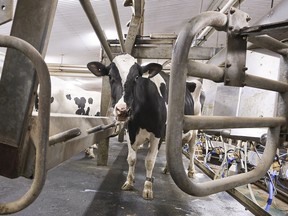With global food security threatened, Ottawa says it must preserve supply management system
Article content
The federal government is pushing ahead with changes to dairy import rules despite protests from the U.S. milk and cheese industry.
Advertisement 2
Article content
Trade Minister Mary Ng says Canada will roll out a new system to manage who’s allowed to import duty-free dairy from the United States, after an international dispute-resolution panel ruled that the old system violated the U.S.-Mexico-Canada Agreement (USMCA). But no one on either side of the border seems to believe the new rules will do anything to change how much American milk and cheese trickles past Canada’s tariff wall.
U.S. milk lobbyists say the changes are superficial and Canada is once again dancing around its obligations under the free trade agreement. But the Trudeau government says it is standing firm to stop the U.S. from weakening the national supply management system, just as war in Ukraine and global supply chain disruptions are highlighting the importance of being able to produce food at home.
Advertisement 3
Article content
“At a time when global food security is under threat, it is even more important that we strengthen and maintain a strong and vibrant domestic dairy industry,” Ng said in a statement on May 16.
The government views supply management as an important tool to ensure the country has a stable food supply and has been fighting with trade partners around the world, including the U.S. and New Zealand, to keep the system intact.
The program was established in the 1970s to protect Canadian dairy, poultry and egg farmers from swings in the market by capping production, setting prices and blocking foreign competitors by charging tariffs of more than 200 per cent.
In free trade agreements, Canada has agreed to loosen its import controls by allowing a set volume of foreign dairy to enter at a dramatically reduced tariff rate, known as tariff-rate quota (TRQ). That quota was expanded under USMCA, the treaty that replaced the North American Free Trade Agreement in 2020. At first, American dairy farmers cheered the extra access to the Canadian market. But soon, the two countries started squabbling over how the quota is handed out.
Advertisement 4
Article content
Canada reserved the vast majority of TRQs for its domestic dairy processors, upsetting U.S. dairy producers and Canadian retailers. The U.S. argued that the policy stopped American firms from getting the full economic benefit from the free trade deal, since Canadian dairy processors were more inclined to bring in cheap cheese and turn it into higher-value retail products, like frozen pizza, rather than import Asiago from Wisconsin.
The Retail Council of Canada, which represents large supermarket chains, has said excluding grocers adds “unnecessary layers and costs” to the food chain at a time when inflation is already accelerating at a pace not seen in a generation.
In January, an international dispute resolution panel sided with the U.S., forcing Canada to come up with a new allocation method that doesn’t reserve the quota for processors.
Advertisement 5
Article content
In response to the ruling, Canada proposed handing out quota based on marketshare instead. The government ran about a month and a half of consultations on the proposed changes, ending on April 19. Now, the government says it is going ahead with the marketshare-based system without making any major changes to the proposal.
“We are confident that the new policies fully comply with the panel’s findings,” Ng said, adding that the panel recognized Canada has the right to hand out TRQs “in a manner that supports Canada’s supply management system for dairy.”
U.S. dairy lobbyists have expressed concerns that the focus on marketshare will still end up sending the bulk of the quota to processors, since they control a large part of the domestic market.
The federal government apparently agrees. A senior government official said the new system is expected to “yield very similar results because that’s how we’ve allocated” in the past.
“I don’t think the U.S. is going to be happy with this,” said the official, who spoke on condition of anonymity. “We wouldn’t anticipate them to be satisfied with anything less than full retailer access. Unfortunately for the United States, they did not negotiate that through (USMCA).”
• Email: jedmiston@nationalpost.com | Twitter: jakeedmiston
Advertisement
Trudeau government stands firm on new dairy rules despite anger from U.S. milk lobby
2022-05-16 12:07:21





